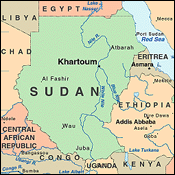 In the latest disclosure of civil penalty information by the Office of Foreign Assets Control, the agency describes a Letter of Violation that it issued against an international evangelical group called Christ for All Nations. According to the disclosure, the ministry “exported goods and services to Sudan in support of a non-commercial event in Sudan during 2006.” Another source describes the “non-commercial event” in Sudan as a religious revival rally in Juba:
In the latest disclosure of civil penalty information by the Office of Foreign Assets Control, the agency describes a Letter of Violation that it issued against an international evangelical group called Christ for All Nations. According to the disclosure, the ministry “exported goods and services to Sudan in support of a non-commercial event in Sudan during 2006.” Another source describes the “non-commercial event” in Sudan as a religious revival rally in Juba:
In the months of July and August 2006 the Christ for all Nations (CfaN) team traveled to Sudan … In Juba, Sudan the team conducted a crusade and fire conference. The response was amazing with over 243,532 people completing a decision card for salvation. The effort required to get to Juba by the technical team was nothing short of heroic. A 1500 kilometer journey over rough roads, and bridges barely able to hold the weight of the huge trucks.
This is probably the first time OFAC has gone after anyone for conducting a church service in a sanctioned country.
Of course, you have to scratch your head to figure out how an overland trip by a German evangelist to a remote area of Sudan to preach violates any of the necessary elements of a violation set forth in the Sudanese Sanctions Regulations. Under Section 538.507, the re-export by non-U.S. persons subject to license requirement under the EAR with less than 10 percent U.S. content and EAR99 items is not prohibited by the regulations. All the goods here came to Sudan by road from other parts of Africa which makes one wonder which of these goods, if any, met these requirements.
And regardless of one’s belief about the efficacy of the services provided at a religious rally, these hardly seem to be “services” in any traditional sense. And even if they are, what regulatory policy is furthered by defining them as such? Does a religious rally in Juba benefit the Sudan-regime in any way that is contrary to the foreign policy interests of the United States?
No fine was imposed by OFAC based on “the licensable, non-commercial nature of the conduct and the non-profit nature of the violator on the other hand.” But is anyone else troubled by the notion that OFAC should be licensing religious services in foreign countries?
 Permalink
Permalink
Copyright © 2010 Clif Burns. All Rights Reserved.
(No republication, syndication or use permitted without my consent.)

 Posted by
Posted by  Category:
Category: 

